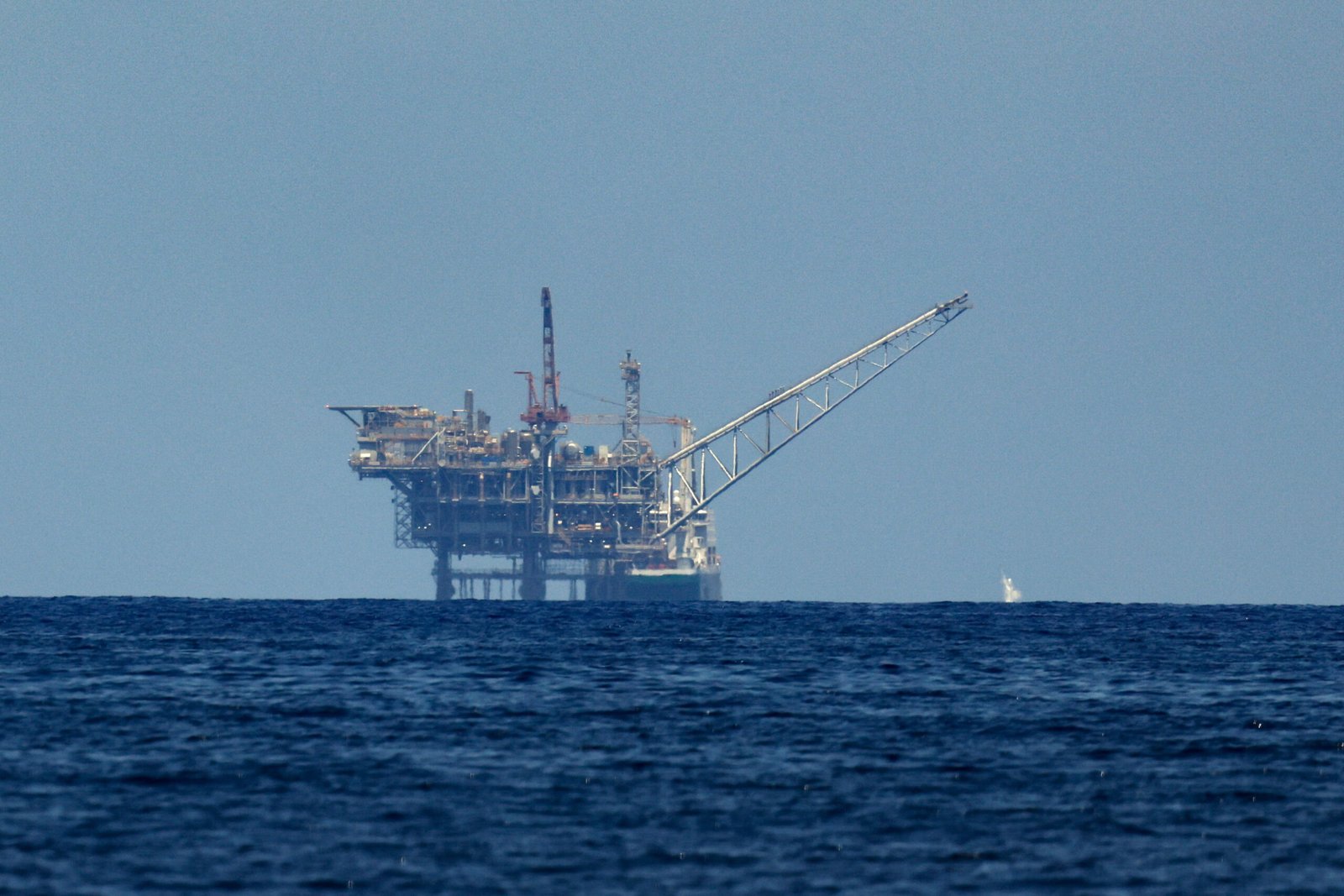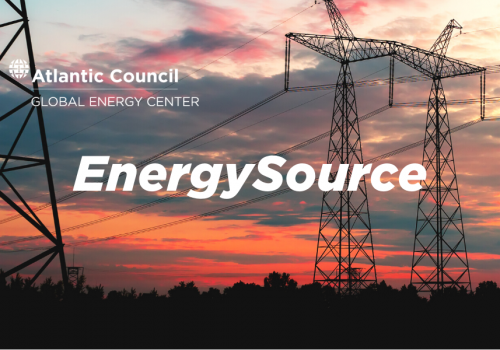As the anniversary of Hamas’ devastating October 7 attack on Israel approaches and the escalation of the Israel-Gaza war continues, tensions in the Middle East show no signs of receding. Iran’s role in supplying, training, and facilitating attacks from Hamas, Hezbollah, and the Houthis is well-known, but fears persist that dismantling this network will lead to a serious escalation with Iran and threaten global energy supplies. But the real risks to the energy sector are not the ones that policymakers and oil traders are focused on.
STAY CONNECTED
Sign up for PowerPlay, the Atlantic Council’s bimonthly newsletter keeping you up to date on all facets of the energy transition.
The risks in the Strait of Hormuz are overblown
The risk that Iran could close the Strait of Hormuz looms large among government and industry leaders, given that one fifth of global petroleum liquids consumption and liquefied natural gas (LNG) trade flows through this narrow waterway. The impacts would be devastating to the global economy—particularly for Asian consumers of Gulf oil.
However, the economic, political, and geographic realities mean that—not only is Iran extremely unlikely to close the strait—it is practically impossible for it to do so.
Economically, Iran has too much to lose. The country exports 1.5 million barrels per day of oil in contravention of US sanctions, up massively from 350,000 in 2019. If the country refused to allow non-Iranian tankers to exit the Gulf, it would expose its own tankers to foreign navies, threatening Tehran’s primary source of revenue. As long as Iran continues to make money selling oil, it will not close the strait.
Politically, Iran can’t afford to jeopardize its relations with the United Arab Emirates (UAE), Saudi Arabia, or China. Over the past five years, Iran has painstakingly rebuilt ties with Saudi Arabia, the most powerful Gulf state, and the UAE, Iran’s most important trading partner. Nor can Iran afford to alienate its best customer and the largest overall importer of Gulf oil—China. Samir Madani, co-founder of TankerTrackers.com, Inc., an independent company that tracks seaborne oil, said it would be incredibly ill-advised for Iran to disrupt Beijing’s oil supply from the Gulf.
Even if Iran were desperate enough to attempt closing the strait, it’s unclear if it could even halt shipping. While the safest and most efficient route through the Strait of Hormuz traverses Iranian waters, tankers can—and do—deviate from it by going through UAE waters. After two British tankers were seized by Islamic Revolutionary Guard Corps (IRGC) ships in 2019, British ships were instructed to avoid Iranian waters despite the increased likelihood of a collision. While a mass rerouting of traffic through UAE waters would be slow and restrict transit volumes, it would be possible for oil flows to continue.
Rather than focusing on a worst-case but extremely unlikely scenario in the Gulf, policymakers should focus on more realistic energy risks in the region.
Instead, worry about disruptions to Israel’s natural gas exports…
Israel produces natural gas through two offshore gas fields, Tamar and Leviathan, which meet Israel’s domestic needs and supply gas to Jordan and Egypt. Egypt uses Israeli gas for domestic demand or liquefies and exports it to Europe. After the October 7 attacks, Israel shut down production from Tamar, forcing Egypt to halt shipments and causing a brief spike in European natural gas prices. At the end of November, Israel resumed flows to Egypt, and exports to Europe continued at lower levels than before the attacks. Since April, however, Egypt has halted all LNG exports in order to use Israel’s natural gas to meet domestic electricity demand.
Israel’s natural gas fields remain vulnerable in the event of a military escalation between Israel and Hezbollah. If gas exports were halted, Egypt—which plays an important role in ceasefire negotiations between Israel and Hamas—could face an energy shortage. Decisionmakers involved in negotiations could offer incentives that would increase Israel’s natural gas deliveries to Egypt or help alleviate Egypt’s power crunch with other sources of natural gas, in exchange for Cairo exerting more pressure on Hamas to accept ceasefire terms.
It would also behoove policymakers to help the two countries expedite plans to build a 40-mile pipeline that would enable Israel to export an additional 6 billion cubic meters per year of natural gas to Egypt. Increasing energy interdependence would not only improve economic and diplomatic relations in the region; but also, increasing Israel’s gas export capacity to Egypt’s liquefaction facilities serves as an insurance policy for southern Europe in the event of a supply crunch.
…And escalation in the Red Sea
Policymakers should work to neutralize the threat of Houthi attacks on ships transiting the Red Sea. Iran is supplying the equipment the Houthis are using to threaten seaborne trade. Since October, the Houthis have attacked more than eighty merchant ships—and dry bulk traffic through the Suez Canal is down 50 percent year-over-year. While some oil tankers now avoid the Red Sea, most have continued to cross the Suez despite higher insurance costs.
A recent attack on a Greek-flagged tanker, the Sounion, should be a wakeup call. The attack caused a fire aboard the ship, which has been abandoned. The vessel, carrying 1 million barrels of oil, is now leaking—if that continues, the environmental disaster could be four times greater than the Exxon Valdez oil spill. While the crew was able to escape, efforts to salvage the ship were called off because the Houthis planted explosives on its deck.
The pattern of escalation in the Red Sea cannot be ignored—whereas previously the Houthis confined their attacks to ships affiliated with Israel or Israeli citizens, this is no longer the case. Since the Sounion attack, insurance companies have nearly doubled the risk premium for Red Sea-bound ships. Only Chinese-owned ships seem to be safe—their insurance premiums have dropped by 50 percent since February.
On September 2, US Central Command (CENTCOM) reported that the Houthis attacked and hit two oil tankers in the Red Sea, one of which was a Saudi very large crude carrier (VLCC) tanker carrying 2 million barrels of oil. The Houthis claimed responsibility only for the attack on the non-Saudi tanker. Saudi Arabia denied that its ship was hit, although the US military maintains that both ships were damaged by “reckless acts of terrorism by the Houthis.”
Though the specifics of the incident remain in dispute, the risks are clear: millions of barrels of oil could spill into the Red Sea or ignite in fires that cannot be extinguished. The ensuing environmental catastrophe and economic disruption would hit all producers and consumers that use the waterway regardless of their political stance on Middle East conflicts. Even if Saudi Arabia can’t publicly acknowledge that its tankers are at risk, it has just as much—if not more—to lose from attacks in the Red Sea.
Even the presence of US naval forces has not deterred the Houthis. US destroyers stationed in the Red Sea faced sustained combat rivalling that experienced during World War II—and still could not thwart every attack. Policymakers need to realize that Houthi activity in the Red Sea is a serious and growing risk to global energy supplies. Currently, the risk is being realized in insurance rates but could quickly spread throughout the global oil market if another tanker is hit.
Focus on the real risks
The ongoing conflict in the Middle East has challenged long-held assumptions about the risk geopolitical instability in a critical region for global energy supplies poses to world markets. Old paradigms, particularly those focusing on the Strait of Hormuz, no longer apply. If industry and financial experts priced in the actual risks to global energy supplies instead of focusing on unlikelier ones, world leaders might be more motivated to better ensure the security of global maritime transportation in the Red Sea.
Ellen Wald is a nonresident senior fellow with the Atlantic Council Global Energy Center and the co-founder of Washington Ivy Advisors.
Meet the author
Related content
Learn more about the Global Energy Center

The Global Energy Center develops and promotes pragmatic and nonpartisan policy solutions designed to advance global energy security, enhance economic opportunity, and accelerate pathways to net-zero emissions.
Image: The Tamar offshore natural gas field is pictured in front of Ashkelon, amid the ongoing conflict between Israel and Hamas, near the Gaza coast, June 25, 2024. REUTERS/Amir Cohen


